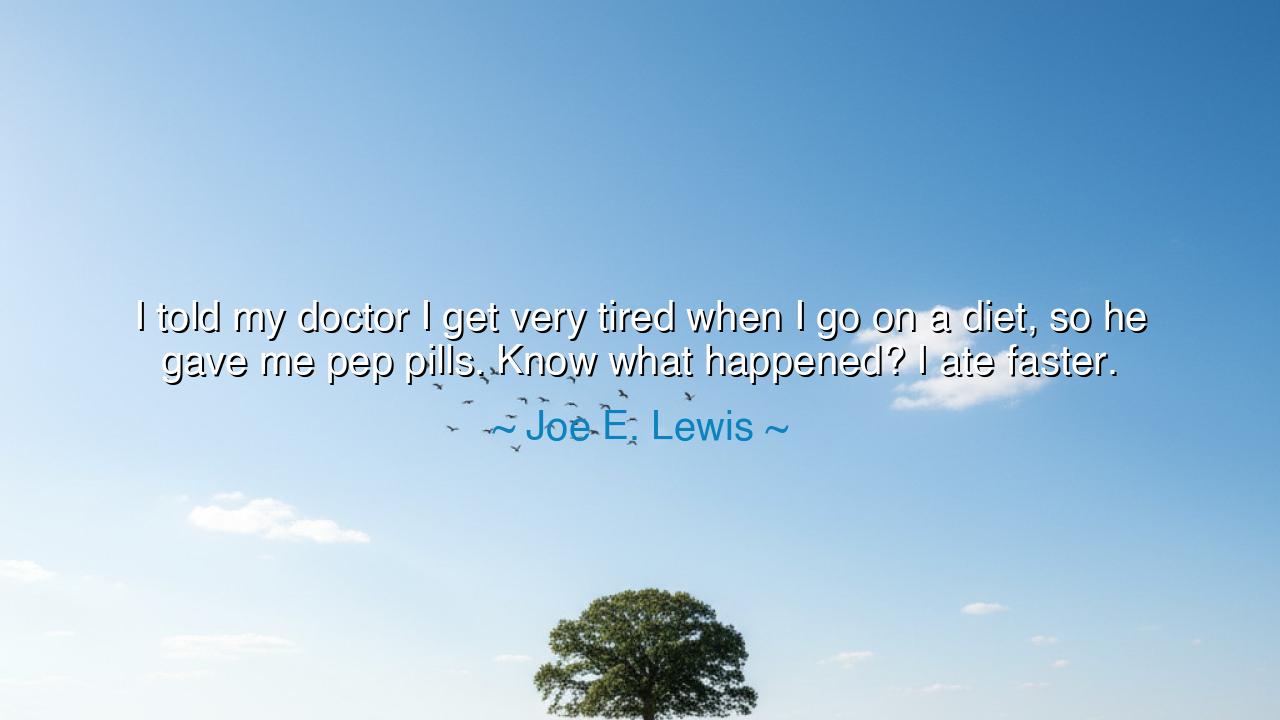
I told my doctor I get very tired when I go on a diet, so he gave
I told my doctor I get very tired when I go on a diet, so he gave me pep pills. Know what happened? I ate faster.






“I told my doctor I get very tired when I go on a diet, so he gave me pep pills. Know what happened? I ate faster.”
So spoke Joe E. Lewis, the sharp-tongued comedian whose wit carried the flavor of both laughter and lament. Beneath his humor lies not only jest, but an insight into the strange folly of human nature — our endless search for shortcuts to discipline, our longing to change without truly changing. The laughter his words provoke is not merely mirthful, but instructive, for in his jest he mirrors our common tendency to seek relief without understanding, to treat symptoms rather than their cause.
In this saying, Lewis paints a picture both comic and tragic — the man who, instead of learning patience and restraint, seeks energy to better indulge his own weakness. His “pep pills,” meant to cure weariness, only quickened his appetite; his cure became the source of his undoing. How often in life do we repeat this same pattern? We hunger for transformation, but flee the cost of effort. We desire freedom from excess, yet chase excess by new means. His story, wrapped in laughter, is in truth a parable of the modern soul — restless, clever, and forever mistaking speed for progress.
The ancients, though they lived without pills or diets, understood this same folly. The philosopher Epicurus, often misread as a preacher of indulgence, taught moderation as the highest pleasure. “If you wish to be rich,” he said, “be content with little.” Yet humanity, even then, sought to satisfy every desire while avoiding its consequence. They built empires not from need, but from greed; they conquered lands not to live, but to possess. So too does the modern man “eat faster” — not with the mouth alone, but with the mind and the soul, consuming life itself without pause, mistaking movement for meaning.
The humor of Joe E. Lewis shines because it is truth dressed as jest. His words remind us that the quick fix — the pill, the plan, the promise — cannot replace the long road of self-mastery. We cannot trick the laws of nature, nor can we outrun the consequences of our habits. The doctor’s “pep pills” are but symbols of all that we use to disguise our unwillingness to face ourselves. They may quicken our pace, but they cannot change our direction. True change, like true healing, comes not from adding more energy, but from finding more awareness — the calm wisdom to understand why we hunger in the first place.
There is an old story told of Diogenes the Cynic, the philosopher who lived in poverty, content with little. When Alexander the Great offered him any gift he desired, Diogenes replied, “Stand out of my sunlight.” In that single request lay the essence of freedom — he needed nothing, and therefore lacked nothing. Joe E. Lewis, in his irony, tells the opposite tale: the man who has everything but peace, who reaches for aid only to find himself more enslaved. Between Diogenes and Lewis stands the eternal lesson — that satisfaction does not come from the speed of consumption, but from the stillness of contentment.
To hear this quote is to laugh, but also to awaken. For laughter, when born of truth, can be a kind of mirror — showing us our contradictions with gentleness rather than shame. Lewis’s humor reminds us to look at our lives with honesty, to see where we too have tried to cheat our own nature. Whether in health, ambition, or love, the same principle applies: if we seek shortcuts, we lose the depth of the journey. The one who eats slower — who savors, who reflects — may taste less, but gains more.
So let this teaching endure:
-
Beware of easy remedies — for they often deepen the ailment they promise to cure.
-
Laugh at your own folly, for humor is the softest form of wisdom.
-
Pursue moderation, not exhaustion; patience, not haste.
-
Remember that self-control is the truest strength, and understanding the finest medicine.
Thus, the wit of Joe E. Lewis becomes a timeless parable. His words, though light and quick as laughter, echo with ancient wisdom: that one cannot outsmart the laws of life. To rush, to force, to seek shortcuts — these only tighten the chains of desire. But to pause, to reflect, to face the struggle with humility — that is the true cure. For the wise have always known that the greatest nourishment is not found in eating faster, but in learning, at last, how to be satisfied.






AAdministratorAdministrator
Welcome, honored guests. Please leave a comment, we will respond soon